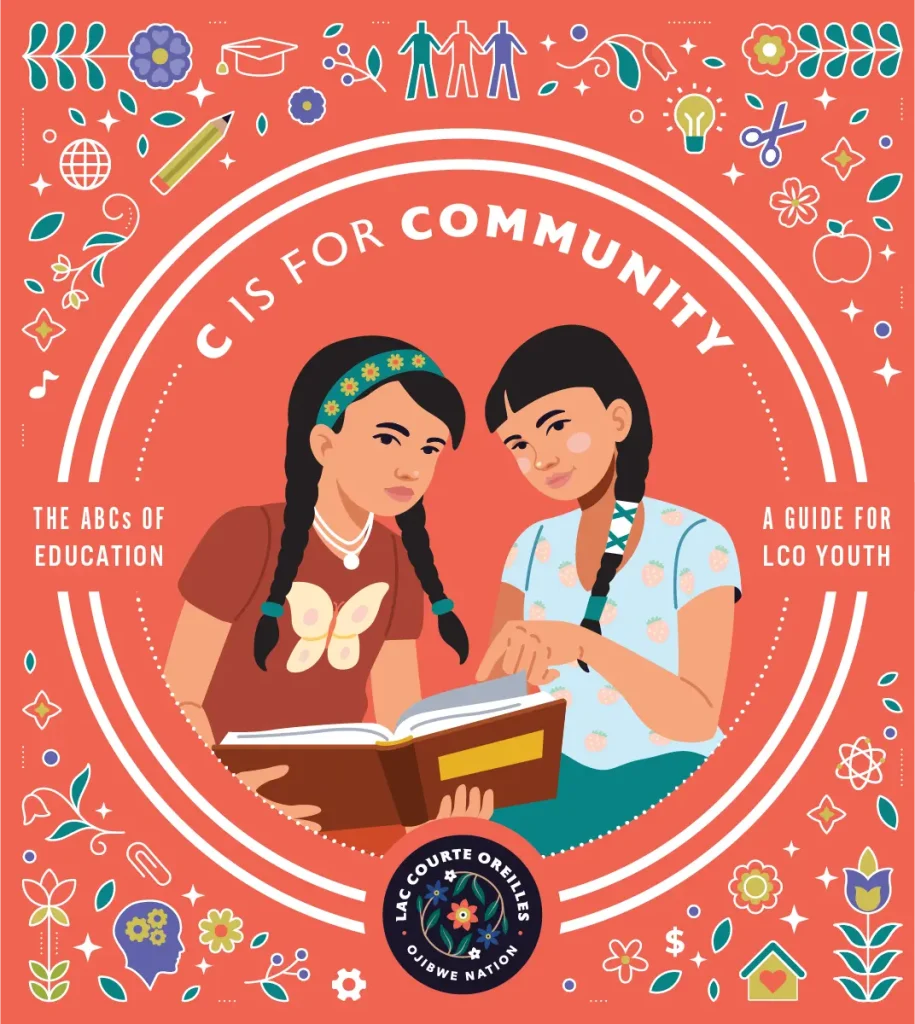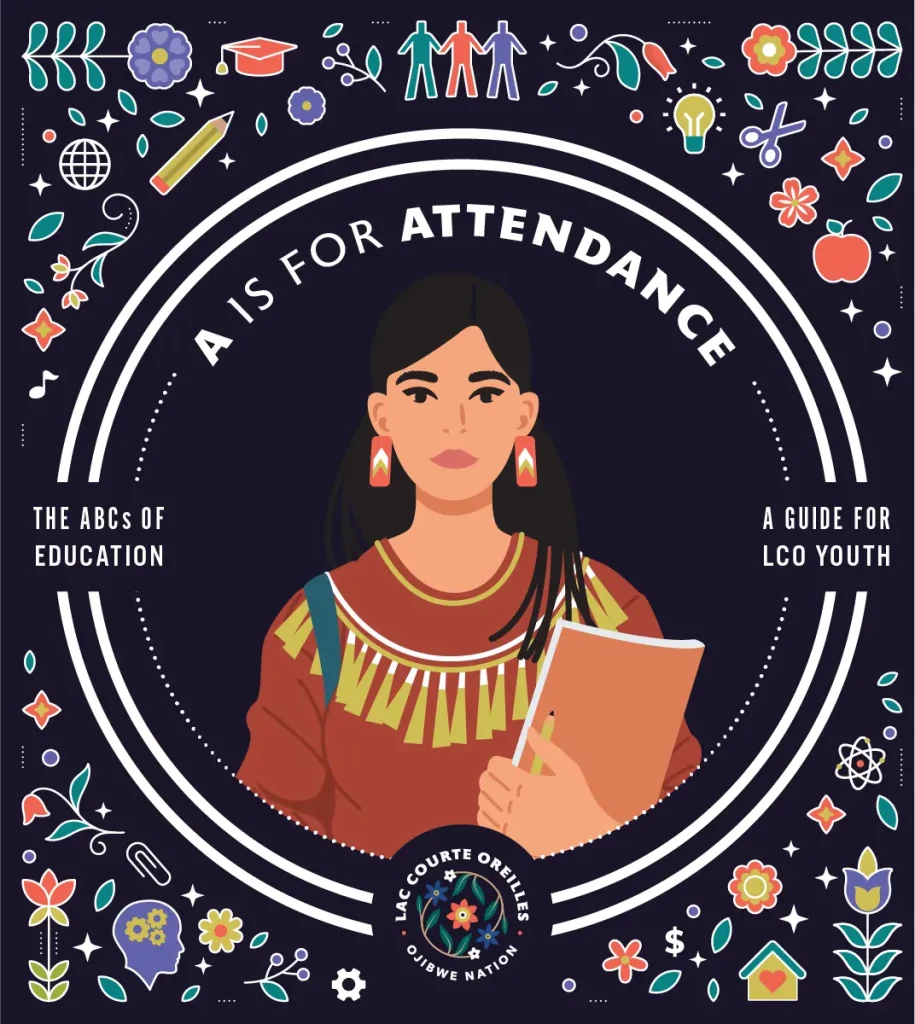Why is education important?
Finishing a formal education and pursuing higher education can benefit you, your family, and your Tribal community in multiple ways. Some of these benefits include:
Better Jobs & Income
Graduating high school and attending college increases your chances of getting a good job with a higher paycheck.
Stronger Skills
Education helps develop skills involving critical thinking, communication, self-control, problem solving, stress management, gathering information, cognitive ability, and identifying choices and consequences. These skills, paired with traditional Anishinaabe values and traditions, strengthens and protects you and your community.
Better Health & Wellness
Education improves your quality of health and reduces health risks such as alcohol and substance abuse and dying from cardiovascular disease, cancer, infection, injury, lung disease, and diabetes.
Stronger Communities
People who graduate from high school and go on to college become stronger individuals who are able and equipped to build up their communities. People who are educated are more likely to vote and volunteer compared to those who drop out of high school. Additionally, communities with more educated members have less criminal activity, trust each other more, and are more likely to promote equality.
Finishing your education gives you more opportunities, helps you make better choices for the future, and prepares you to live a better life.


The Dangers of Dropping Out
Frequent absences and dropping out of school can lead to other problems down the road. Some of these issues include:
Unemployment
People who drop out of high school are twice as likely to be unemployed compared to people who graduate from college.
Alcohol & Drug Use
People who drop out of high school are up to 6 times more likely to abuse alcohol and other drugs compared to people who graduate from high school and go on to receive a college degree.
Crime & Prison Time
Due to fewer economic opportunities, people who drop out of high school are more likely to get involved in crime and end up in jail. Nearly half of incarcerated people do not have a high school degree.
Poor Health
People who drop out of high school have higher healthcare bills. The average annual public health costs is $2,700 per high school dropout, compared to $1,000 per high school graduate and $170 per college graduate. Additionally, high school dropouts are more likely to die early from cardiovascular disease, cancer, infection, injury, lung disease, and diabetes.
Staying in school, on the other hand, helps decrease the likelihood of these problems later on.
Did You Know?

of Native American students nation wide are frequently absent from school.
Source: ed.gov
of students in Wisconsin are frequently absent from school.
Source: future-ed.org
of students in the U.S. are frequently absent from school.
Source: future-ed.org
of Native American students graduate from high school - the lowest graduation rate of all American students.
Source: nativehope.org
of all Native American students dropped out of school in 2022 – the highest rate of all American students.
Source: nces.ed.gov
of Native American young adults earned a bachelor degree or higher in 2022.
Source: nces.ed.gov

Learning Our Way
These tips can help you stay on track, connect what you learn to your roots, and be successful.
Participate in Cultural Activities
The Lac Courte Oreilles Ojibwe School is committed to providing the best education for students. In addition to providing traditional western education, the school teaches Ojibwemowin and traditional cultural traditions as part of the coursework.
Even if you don’t attend LCO Ojibwe School, there are other ways to participate in traditional cultural activities. Participation can include:
- Attending gatherings and celebrations, such as powwows
- Learning Ojibwemowin
- Learning and playing traditional games
- Learning traditional practices such as:
- Gathering traditional foods and medicines
- Singing traditional songs and playing traditional music
- Telling traditional stories
Avoid Absences
Missing school can make it more difficult to keep up with coursework. Students who are frequently absent are four times more likely to drop out of school compared to their peers.
Take Care of Yourself
Your health can affect how well you learn and complete schoolwork. Eating healthy foods, getting enough sleep, exercising regularly, and taking time to relax will help you do well both in school and in other areas of your life.
If you are struggling with your health, or if your health is affecting your attendance, talk with a doctor to find solutions.
Be Kind
Being kind can have huge benefits for you, your school, and your community. Some of those benefits include:
- More happiness
- More empathy
- Stronger sense of belonging
- Improved self-esteem
- Better relationship and connection with peers
- Better health
- Less stress
- More gratitude
- Better concentration
- Improved results in schoolwork
- Less depression
- Less bullying
Your education can honor your Anishinaabe heritage, help you live well, and build a stronger community.


Frequently Asked Questions
What can I do if I am struggling with issues at school?
Issues at school can make finishing schooling more difficult, which may lead to frequent absences and potentially dropping out. There are several issues that can make school more difficult, which can include:
- Anxiety, high levels of stress, depression, or other mental illnesses
- Feeling misunderstood by teachers and classmates
- Bullying and cyberbullying
- Difficulties making or keeping friends
- Difficulties focusing or learning
- Feeling unwell, especially over a long period of time
Asking for help is not a bad thing. In fact, addressing these issues can help you do better in school, finish your education, and be happier overall. Talk with your parents and teachers to see what solutions and resources may be helpful. Depending on your circumstances, you and your family may need additional help so you can attend school regularly and be more successful. Some solutions may include:
- Talking with a healthcare provider about difficulties in learning or focusing to find a solution, such as testing for ADHD or getting glasses
- Talking to a healthcare provider about treatment for your mental health
- Learning about bullying and what you can do to stop it
What can I do if I am struggling with issues at home?
Issues at home can also make it difficult to do well in school. Some issues may include:
- Homelessness
- Lack of food at home
- Lack of transportation
- Abuse or neglect
Depending on your circumstances, you and your family may need additional help so you can attend school regularly. Talk with your teachers and other school staff to determine what resources may be available and helpful for your circumstances.
If you or someone you know are the victim of abuse or neglect, please reach out to an adult you trust. Remember that you do not deserve to be treated this way and it is not your fault. For more information and resources on child abuse, visit the LCO Stand Against Child Abuse website.
As a parent, how can I work with educators to help my child succeed in their education?
Parents can work with educators to find resources for their child, request accommodations as needed, and more. When parents are partnered with educators and involved in their child’s education, children improve in academic success. The U.S. Department of Education provides sample questions, including questions about attendance, that can guide parents in their efforts to partner and work with their child’s teachers and school.
As a parent, how can I encourage my child to complete schoolwork?
Let your child know that you are there to help them if they need it and that you see their hard work. Positive reinforcement, such as praise or a high five, can be motivating for your child. You can also reward your child for the effort they put into their schoolwork; for example, you might get your child a small treat for completing a project. Finally, help them connect their long-term goals with their current efforts in schoolwork and other related activities.

